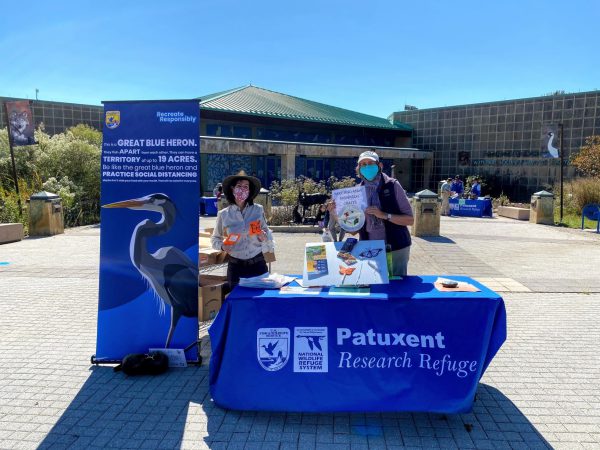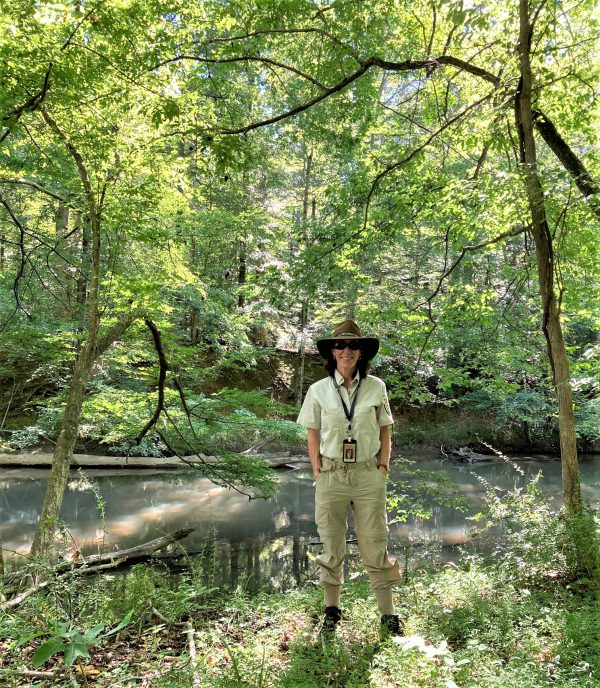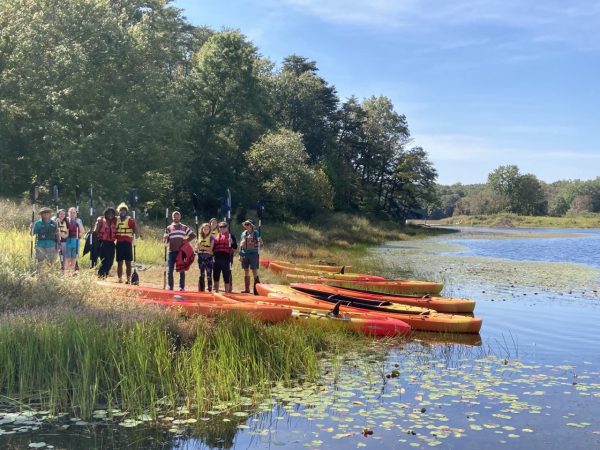
Refuge in May 2020.
Kalamazoo College alumna Jennifer (Heck) Greiner ’90 has a key role to play February 22 as conservationists mark National Wildlife Day.
In May 2020, Greiner assumed the position of refuge manager at Patuxent Research Refuge, a unit of the National Wildlife Refuge System managed by the U.S. Fish and Wildlife Service (Department of the Interior). There, much like those who organize National Wildlife Day, she and refuge staff encourage the public to develop a relationship with nature.
“With our location between Washington, D.C., and Baltimore, we offer ‘nearby nature’ for 9 million people,” Greiner said. “This is everyone’s land and we’re working hard to help folks experience it.”
The refuge, established in 1936 by then-President Franklin D. Roosevelt, is the nation’s only national wildlife refuge founded specifically to support wildlife research. Since that time, the refuge has grown from 2,670 acres to 12,841 acres, encompassing land formerly managed by the Departments of Agriculture and Defense.

Patuxent River, which flows through Patuxent Research Refuge
and is named after the Pawtuxent tribe.
Patuxent offers hunting, fishing, horseback riding, wildlife observation, hiking and cycling trails, interpretive and youth programs at the National Wildlife Visitor Center, in addition to study sites for a variety of researchers. Greiner manages 12 environmental professionals whose collective goal is to make their urban community more aware of the benefits of spending time in nature while building their comfort and confidence levels through outdoor skill-building.
“We’ve realized that so much of the future of conservation relies on people feeling connected to nature,” Greiner said. “Now more than ever, people appreciate that there’s more to the world than just us. During stressful times, nature provides us with a variety of ways to relax, whether through active pursuits like hunting, fishing, birdwatching and wildlife photography, or simply walking and sharing a picnic. It helps people’s physical health and mental health to realize there’s so much beauty in the world around us and it’s important to slow down and enjoy it.”
National Wildlife Day brings to the public an awareness of endangered animals while acknowledging the zoos, animal sanctuaries and wildlife preserves that protect those animals and practice conservation. It was first celebrated on September 4, 2005, before conservationists decided they needed to double their awareness efforts. A second holiday, February 22, was selected because it was the birthday of wildlife expert and environmentalist Steve Irwin. Irwin was known as TV’s Crocodile Hunter before his death in 2006.

residents in that area enjoy nature, the refuge offers activities such as hunting, fishing and
horseback riding, and introductory classes in camping, fishing, kayaking and more.
Greiner’s own love of nature and wildlife developed growing up on the shore of Lake Huron, and evolved into a love of ecology during her years at K. In her sophomore year, Greiner completed her career development internship on Capitol Hill with the Congressional Research Service, where it was her job to research all angles of environmental issues and present them from an unbiased perspective.
In her senior year, Greiner’s senior independent project (SIP) took her to Texas A&M University, where she performed sea turtle research in a lab setting, yet she longed for her days of interacting with the public. As a result, after earning a graduate degree in natural resource policy administration from the University of Michigan, she returned to Washington, D.C.
Through her Capitol Hill work, Greiner authored briefing papers that covered issues such as the ivory trade and elephants, the reintroduction of wolves in natural areas out west and the reauthorization of the Endangered Species Act. Such experience made Greiner an ideal candidate for a role involving endangered species with the U.S. Fish and Wildlife Service, where she has worked since 1994.
Now, as the Patuxent Research Refuge’s manager, she relishes the daily opportunity to connect people with nature. “Our focus is on making people feel welcomed and developing outdoor skills,” she said. “That could involve something as basic as providing a trail map or it could be more involved, like providing loaner fishing gear or binoculars and bird-spotting scopes for people who want to learn about birding. We also offer some introductory classes in things like camping, fishing and kayaking to give people the skills and the confidence they need to pursue those activities.”
Greiner hopes you’ll also pursue similar activities in your neck of the woods this National Wildlife Day to strengthen your ties to nature and your neighbors.
“Somehow, the great outdoors has become viewed as something of a luxury that is separate from, rather than an intrinsic part of, everyday life for many Americans,” Greiner wrote in a recent Friends of Patuxent Newsletter. “Experiencing nature, even ‘nearby’ nature, often relies on driving somewhere, often out of urban centers; knowing things like trail locations, wildlife names and outdoor skills; or possessing things such as gear, maps and entrance passes. At the same time, part of the beauty of natural systems is their interconnectedness, how the sum reflects the beauty of parts, each of which depends to some extent on another. Indigenous settlers along the Patuxent understood this. Communities thrived on familiarity with the river and landscape draining to it. Natural systems are inherently diverse. Can you imagine a forest with only one type of tree? A feeder that attracts only one type of bird? A garden with only one color? Lakes containing a single fish species? As a community, we can learn a lot from nature’s showcase, helping people feel less cut off and more connected to their outdoors and to each other.”
